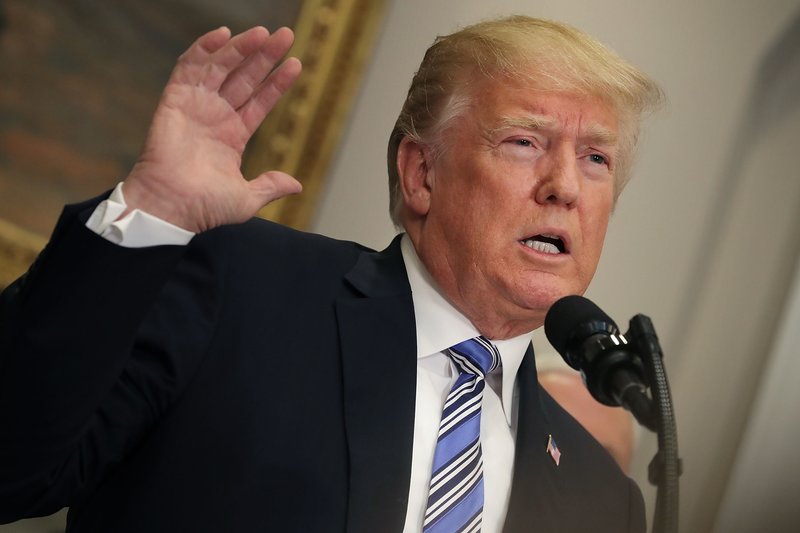華爾街投資者最擔(dān)心貿(mào)易戰(zhàn)

|
美國總統(tǒng)唐納德·特朗普對中國商品征收關(guān)稅,,涉及金額高達(dá)每年600億美元,消息傳出后,,華爾街投資者對于貿(mào)易戰(zhàn)的擔(dān)憂甚至超過了對恐怖主義的擔(dān)憂,。 CNBC聯(lián)邦調(diào)查(Fed Survey)公布了這一結(jié)果。調(diào)查發(fā)現(xiàn)接受調(diào)查的40名華爾街投資者,,最大的擔(dān)憂是貿(mào)易保護(hù)主義,。有75%的受訪者將對貿(mào)易戰(zhàn)的擔(dān)憂,排在了通貨膨脹,、恐怖主義和美聯(lián)儲之前,。 在調(diào)查期間,有報(bào)道稱特朗普準(zhǔn)備對中國商品征收關(guān)稅,,涉及金額達(dá)到600億美元,,是最初估計(jì)金額的兩倍?!度A盛頓郵報(bào)》報(bào)道稱,,特朗普至少將在周五公布部分關(guān)稅措施。作為回應(yīng),,中國國家總理李克強(qiáng)警告稱“中美貿(mào)易戰(zhàn)沒有贏家,。”包括多年來通過銷售廉價(jià)中國商品獲益的沃爾瑪(Walmart)和好市多(Costco)在內(nèi)的美國零售商,,呼吁美國總統(tǒng)重新考慮關(guān)稅措施,。 經(jīng)濟(jì)學(xué)家和自由貿(mào)易倡議者也不支持特朗普征收鋼鋁關(guān)稅的決定。雖然白宮將允許授予關(guān)稅豁免,,但豁免規(guī)則仍不明確,。 投資者似乎非常擔(dān)心特朗普的關(guān)稅計(jì)劃對股市的影響。自去年7月份以來,,CNBC調(diào)查的受訪者首次降低了對標(biāo)準(zhǔn)普爾500指數(shù)的前景預(yù)期,。 新任美國國家經(jīng)濟(jì)委員會(National Economic Council)主席拉里·庫德洛似乎認(rèn)為關(guān)稅是一種談判工具,而不是最終結(jié)局,。 本月早些時(shí)候,,庫德洛接受了《紐約客》采訪,他在提到特朗普時(shí)表示:“當(dāng)特朗普總統(tǒng)宣布對所有國家征收關(guān)稅的時(shí)候,,我是不贊同的,。但另一方面,,在這些天與總統(tǒng)先生的對話中,他非常明確地指出他自己也不喜歡征收關(guān)稅,!我認(rèn)為特朗普總統(tǒng)會推出定向關(guān)稅,,這是計(jì)劃的一部分。而中國將成為被針對的目標(biāo),?!保ㄘ?cái)富中文網(wǎng)) 譯者:劉進(jìn)龍/汪皓 |
As President Donald Trump imposed tariffs against Chinese products totaling a reported $60 billion annually, fears of a potential trade war are topping even those of terrorism among Wall Streeters. That’s according to a CNBC Fed Survey, which found protectionism to be the top concern among its 40 Wall Streeter respondents. Nearly 75% of survey takers said as much, ranking fears of a trade war above concerns about inflation, terrorism, and the Federal Reserve. The survey comes amid reports that Trump is planning to tax Chinese products for $60 billion annually, double initial estimates. At least some of those tariff measures could come as soon as Friday, the Washington Post reported. In response, Chinese Premier Li KeQiang warned that “no one will emerge a winner from a trade war.” U.S. retailers, including Walmart and Costco, who have benefitted for years by selling cheaper Chinese products, are urging the president to reconsider such a tariff. Economists and free trade advocates have also balked at Trump’s decision to impose tariffs on steel and aluminum. While the White House is now allowing exemptions on the tariffs, the rules for these exemptions are still unclear. And investors appear to worry about how it may affect the stock market. For the first time since July, respondents to CNBC’s survey lowered their outlook of the S&P 500. The new National Economic Council chairman Larry Kudlow appears to see the tariffs more as a negotiating tool than the end game. “Look, I didn’t like it when he announced across-the-board tariffs around the world,” Kudlow told the New Yorker in reference to Trump earlier this month. “On the other hand, in my conversations with the president in recent days, he’s made it very clear he doesn’t like tariffs either! I think you’ll see targeted tariffs, and that’s part of the game. China is probably going to be a target here.” |













